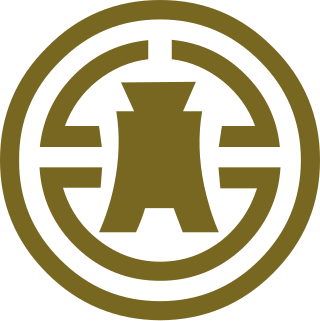The New Taiwan dollar is the official currency of Taiwan. The New Taiwan dollar has been the currency of Taiwan since 1949,when it replaced the old Taiwan dollar,at a rate of 40,000 old dollars per one new dollar. The basic unit of the New Taiwan dollar is called a yuan (圓) and is subdivided into ten chiao (角),and into 100 fen (分) or cents,although in practice both chiao and fen are never actually used.
MEVAS Bank was a bank based in Hong Kong. It was established in April 2001 with a total investment of ¥300 million (US$46,511,627.91). Within the first two weeks of its opening,over a thousand people signed up for their banking services. The bank marketed itself as being Hong Kong's first virtual bank and publicised that customers could use it to do 24-hour online banking. MEVAS Bank's targeted clientele was young professionals.

The Bank of Taiwan is a commercial bank headquartered in Taipei,Taiwan. It was the main issuer of banknotes on the island from 1899 to 1961,when that role was taken over by the Central Bank of China. The Bank of Taiwan is owned by the Government of the Republic of China.

The Shanghai Commercial and Savings Bank is a bank of the Republic of China,currently based in Taipei,Taiwan.
China's banking sector had CN¥319.7 trillion in assets at the end of 2020. The "big four/five" state-owned commercial banks are the Bank of China,the China Construction Bank,the Industrial and Commercial Bank of China,and the Agricultural Bank of China,all of which are among the largest banks in the world As of 2018. The Bank of Communications is sometimes included. Other notable big and also the largest banks in the world are China Merchants Bank and Ping An Bank.
The history of banking in China includes the business of dealing with money and credit transactions in China.
The Taiwan Cooperative Bank Baseball Team,also known as TCB Baseball Team,is one of the two amateur baseball teams in Taiwan's First Division amateur baseball league that are owned by government sponsored corporation. The team is owned by Taiwan Cooperative Bank.
The Politics of Anhui Province in the People's Republic of China is structured in a dual party-government system like all other governing institutions in mainland China.

The Taiwan Cooperative Bank is a publicly listed bank headquartered in Taipei,Taiwan. Originally formed by the Japanese during Japanese rule in Taiwan in 1923,in 1946 and has grown ever since. Today,it is one of the largest banks in Taiwan,having the most branches (301) among other banks.
Taiwan Financial Holdings Co.,Ltd. is a Taiwan based state-owned corporation that is the parent holding company of the Bank of Taiwan,BankTaiwan Securities and BankTaiwan Life Insurance.

Wuqiu is a rural township of Kinmen County (Quemoy),Taiwan (ROC) made up of a group of islands in the Taiwan Strait comprising two major islands,Daqiu and Xiaoqiu. Wuqiu Township is nominally de jure part of Futian County,Fukien of the Republic of China. It is the smallest township in Kinmen County and is located 72 nmi (133 km) northeast of the rest of the county. The township is 73 nmi (135 km) from the Port of Taichung on Taiwan. The closest territory under China (PRC) control is the neighboring Luci Island,Xiuyu District,Putian,Fujian,which is 9 nmi (17 km) to the north-northwest. Greater Qiu Island is the site of the Wuqiu Lighthouse.

Li Hsing or Lee Hsing (李行) is a Taiwanese film director. He was born Lee Tz-da (李子達) in 1930 in Shanghai and died in 2021. He made one of the early popular Taiwanese films in the late 1959,Wang and Liu Tour Taiwan (王哥柳哥遊台灣),though he did not speak Taiwanese. He was also the key director in the promotion of Healthy Realist film (健康寫實片) and Literary Romantic film (愛情文藝片). He was awarded the best director at Golden Horse Awards three times and had seven films awarded the best feature film:Beautiful Duckling,The Road,Execution in Autumn,Land of the Undaunted,,He Never Gives Up,The Story of a Small Town,and Good Morning,Taipei. After he made his last film The Heroic Pioneers,he vowed to be the lifetime volunteer for the promotion of development of Taiwan cinema. In 2009 he established the Cross-Strait Films Exchange Committee,which has been the main,if not only,organization promoting the interaction and cooperation of Taiwanese and Chinese filmmakers. Lee Hsing is often referred to as the “godfather of Taiwan cinema”for his great contribution to Taiwan cinema.

China Development Financial Holding Co.,Ltd. is a Financial Holding Corporation in Taiwan. It mainly does business with its key subsidiaries the CDIB Capital Group,KGI Securities,KGI Bank and China Life.

The Ta-Ching Government Bank,known as the Ta-Ching Bank of the Ministry of Revenue (大清戶部銀行) from 1905 to 1908,was the name of the Bank of China as a government agency of the Qing dynasty until the empire's dissolution in 1912. It was originally created to serve as the central bank of China in 1905,originally as a division of the Ministry of Revenue,and would serve as the country's de facto central bank until the establishment of the Central Bank of China in 1924.

The banknotes of the Ta-Ching Government Bank,known as the banknotes of the Ta-Ching Bank of the Ministry of Revenue from 1905 to 1908,were intended to become the main form of paper money in the Qing currency system. These banknotes were issued by the Ta-Ching Government Bank,a national bank established to serve as the central bank of the Qing dynasty. The Ta-Ching Government Bank had branches throughout China and many of its branches outside of its headquarters in Beijing also issued banknotes.

Lee Shih-ke was a Chinese-born murderer and armed robber who perpetrated Taiwan's first gunpoint bank heist. An army veteran and taxi driver,he murdered a police officer in January 1980 with the intention of using the officer's gun to rob a bank. He carried out the robbery on April 14,1982,and was captured and executed within six weeks. However,before his capture,the police had wrongly arrested another man and produced a false confession using torture;the suspect committed suicide whilst in police custody. Lee gained a reputation as "Taiwan’s Robin Hood" due to his anger at the “nouveau riche”class and a golden statue was erected in his honor in New Taipei City,whilst legal reforms were introduced to prevent false confessions and police torture.
Liang Kuo-shu was a Taiwanese politician who served as the 14th Governor of the Central Bank of the Republic of China.
The COTA Bank is a commercial bank headquartered in Central District,Taichung,Taiwan. By 2017,the bank had 30 branches in Taiwan,employed 1,100 people,and had NT$6.3 billion under management. 16 of the branches are in Taichung,while the rest are in Taipei,Xinzhuang,Banqiao,and Nanbu.

Li Ming was a Chinese banking and investing pioneer. He formed the Chekiang Industrial Bank in 1922 and was General Manager and later Chairman until 1949. In 1950 he founded the Chekiang First Bank Ltd. in Hong Kong,and served as Chairman until his death in 1966. Over the course of his career he held more than thirty directorships in banks,industrial concerns,insurance companies and public utilities,and served in many key governmental positions of financial administration. He was a founder and Chairman of the Shanghai Bankers' Association.

Chen Chen is a Taiwanese actress active in the late 1960s and 1970s. From 1966 to 1986 Chen Chen has starred in about 90 movies. Her work was in a range of genres,from Taiwan's literary romantic films to patriotic films,and earned her various accolades,including two Best Actress awards at the Asian Pacific Film Festival. In 2013,Chen Chen received a Lifetime Achievement Award at the 50th Golden Horse Awards.













